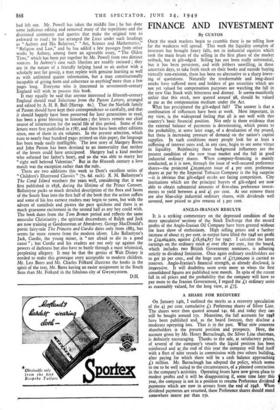FINANCE AND INVESTMENT
By CUSTOS
ONCE the stock markets begin to crumble there is no telling how far the weakness will spread. This week the liquidity complex of investors has brought heavy falls, not in industrial equities which took the main brunt of the selling in the first phase of the market setback, but in gilt-edged. Selling has not been really substantial, but it has been persistent, and with jobbers unwilling, in these uncertain days, to take fresh stock on their books and outside buying virtually non-existent, there has been no alternative to a sharp lower- ing of quotations. Naturally the irredeemable and long-dated stocks have suffered most and holders of gas securities which are not yet valued for compensation purposes are watching the fall in the new Gas Stock with bitterness and dismay. It seems. manifestly unfair that this stock, now quoted around 98, should be valued at par as the compensation medium under the Act.
What has precipitated the gilt-edged fall? The answer is that a combination of influences have been at work. Most important, in my view, is the widespread feeling that all is not well with this country's basic financial position. Not only is there evidence that the external balance of payments is deteriorating, which points to the probability, at some later stage, of a devaluation of the pound, but there is increasing pressure of demand on the - nation's capital supplies. In such conditions many people look for at least a stiffening of interest rates and, in any case, begin to see some virtue in liquidity. Reinforcing these background influences are the present condition of the new issue market and the fall in good industrial ordinary shares. When company-financing is mainly conducted, as it is now, through the issue of well-secured preference shares—the projected £2o,000,coo issue of 4 per cent. preference shares at par by the Imperial Tobacco Company is the big surprise —it is obvious that gilt-edged stocks are facing competition. City institutions which are the principal buyers of gilt-edged are now able to obtain substantial amounts of first-class preference invest- ments to yield between 4 and 4+ per cent. At one remove there are also blue-chip industrial ordinary shares, with dividends well covered, now priced to give returns of 5 per cent.
ANGLO-IRANIAN RESULTS
It is a striking commentary on the depressed condition of the more speculative sections of the Stock Exchange that the record profits of the Anglo-Iranian Oil Company have been greeted without the least show of enthusiasm. High selling prices and a further increase of about 25 per cent. in output have lifted the 1948 net profit to £24,064,920, against £18,564,857 for 1947. I calculate the latest earnings on the ordinary stock at over 180 per cent., but the board, which includes two British Government nominees, is adhering strictly to dividend limitation. Once again ordinary stockholders are to get 3o per cent., and the huge sum of £17,000,000 is carried to reserves. Anglo-Iranian's financial strength, as already disclosed, is impressive. It will doubtless seem even more so when the first consolidated figures are published next month. In spite of the recent fall in oil prices and the probability that the com_pany will have to pay more to the Iranian Government, I regard the £i ordinary units as reasonably valued, for the long view, at £7*.
A SHARE FOR RECOVERY
On January 14th, I outlined the merits as a recovery speculation of the 4f per cent. cumulative Li Preference shares of Silver Line. The shares were then quoted around 14s. 6d. and today they can still be bought around iss. Meantime, the full accounts for 1948 have been published and, as the board forecast, they disclose a moderate operating loss. That is in the past. What not,/ concerns shareholders is the present position and prospects. Here, the account given by Mr. Henry Barraclough, the Silver Line chairman, is definitely encouraging. Thanks to the sale, at satisfactory prices, of several of the company's vessels the liquid position has been reinforced and at the end of this year the company will find itself with a fleet of nine vessels in commission with two others building, after paying for which there will be a cash balance approaching Li million. Mr. Barraclough has adopted the policy, which seems to me to be well suited to the circumstances, of a planned contraction in the company's activities. Operating losses have now given place to modest profits and it will be disappointing if, some time later this year, the company is not in a position to resume Preference dividend payments which are now in arrears from the end of 1948. When dividend payments are resumed, these Preference shares should stand somewhere nearer par than iss.


































 Previous page
Previous page